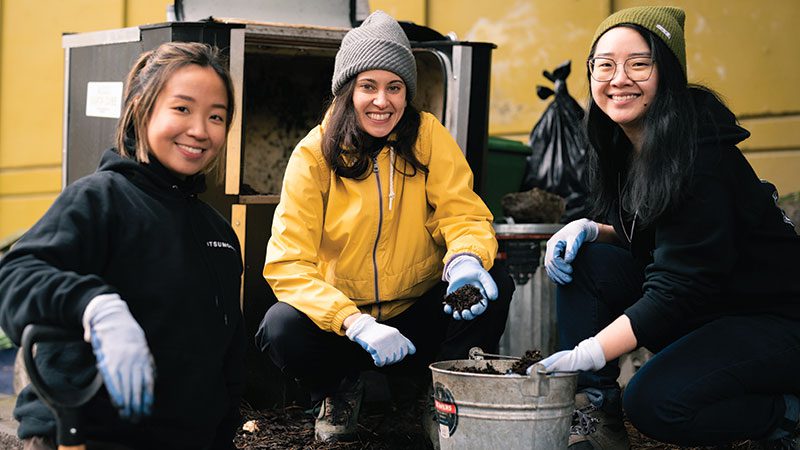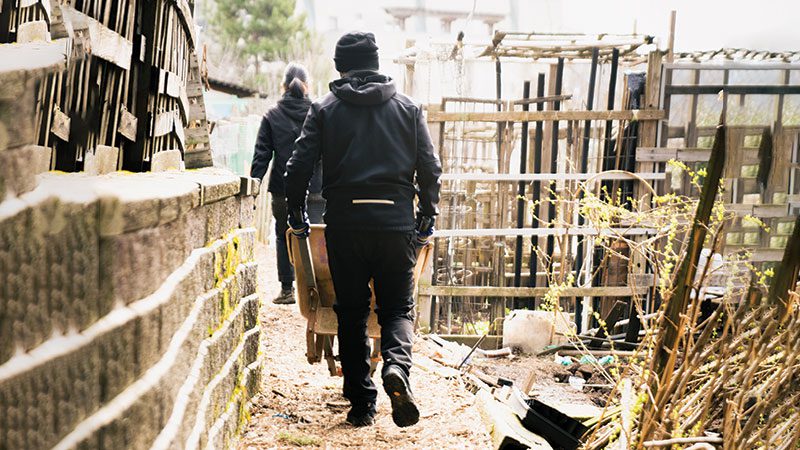Hyperlocal composting with Restaurant 2 Garden
By Naomi Tomky, guest contributor
This article was originally published in June 2023

Joycelyn Chui, Elizabeth Baskerville and Jennifer Cheung make hyper-local compost through Restaurant 2 Garden. Photos by Daniel Tran.
Frustrated with the lack of progress she made increasing composting rates in Seattle’s Chinatown-International District, Joycelyn Chui realized she needed to think smaller.
“It’s difficult for people to see where things go beyond the green bin,” said the contractor with Seattle Public Utilities. In the centralized system run by the city, she found, nobody thought much about what happened to the food waste after it was carted away.
She realized a hyperlocal approach might change habits and increase composting rates in a way that tactics like printing posters had not. That was the genesis of a pilot project called Restaurant 2 Garden, where neighborhood food waste would be transformed into neighborhood compost.
Chui grew up in Hong Kong and studied environmental science in school, but graduated knowing that her version of science required getting involved with her community. “I wanted to talk to people about this, I want to lower the bar, I want to make environmental information and education more accessible for people who look like me, who speak the same language as me,” she said.
She found a like-minded partner in Elizabeth Baskerville, then the garden manager at the Danny Woo Community Garden—the Chinatown-International District’s only garden-friendly green space, where Asian American and Pacific Islander elders tend to 100 plots over 1.5 acres. They soon added a third team member, Jennifer Cheung, and the work began.
“We are able to tell that story: ‘Your food scraps actually don’t go very far. They go one block away or they go three blocks away, to this garden,’” Chui said. “Chances are they know people who garden there, because that’s a really tight-knit community.” With the scraps going so close, neighbors and business owners could walk over or stop by to see what is happening to their food waste, watch the hot composting in action, and understand exactly why they can’t put plastic into the compost bins that end up there.
The pilot project collected 4,000 pounds of food waste from two restaurants, the Panama Hotel Tea House and Itsumono, over the course of a year, equal to the food wasted by 16 average American families. They guided the restaurants through every step to understand how to create a repeatable process. “The dishwasher is the key to success,” Chui says.

Seed grants from the city Department of Neighborhoods and Waste Management funded the purchase of an “Earth Cube,” a small in-vessel compost container made by Bainbridge Island company Green Mountain Technologies from an upcycled IBC—a giant container used to store and transport liquids like olive oil or liquor. The self-contained unit prevented pest issues and required no power—except that provided by volunteers at Restaurant 2 Garden’s weekly work party.
“The answer is yes, we can do it, and there is a huge appetite for this type of work,” concluded Chui and her partners. “And there is the appetite from neighboring restaurants that want to participate with us.” In fact, one of the challenges the pilot faced was too much demand for the small amount of compost it could manually produce. “[People] would literally rush down to the garden and ask if we can give them some compost or save them some,” Chui says. “Sometimes they would bring us breakfast; it was pretty cute.”
In addition to their own project, Restaurant 2 Garden has given guidance to other entities, like homeowner associations, on starting their own decentralized composting projects. “If you see space that’s not being used right now, we can try to do something effective.”
Which is exactly how the project found its own next step: They identified a plot of land in the Chinatown-International District rendered unbuildable by an I-5 easement, which would allow them enough room to upgrade to a larger machine without deviating from the focused approach. “The idea is to stay in the neighborhood, to do hyperlocal composting, to decentralize organics management.”
To use the land, though, they will need approval from the state Department of Transportation, which has been their biggest challenge so far. “There’s been a lot of interest from public agencies,” says Chui. “But I can’t say it translates to a lot of action.”
The delay hasn’t slowed down Chui, Baskerville and Cheung, though: they’re already scheming how to incorporate green stormwater infrastructure at the site. Both Chui and Baskerville worked on stormwater in their previous jobs, and it’s one of the biggest sources of pollution in this rainy part of the world. And while they keep going, the larger community might start catching up.
While Restaurant 2 Garden lures people into sorting food waste with the metaphorical carrot, the state of Washington prods with the stick. The Washington Legislature passed House Bill 1799 in 2022, requiring state and local governments, businesses and other organizations in the state to reduce the amount of organic materials disposed in landfills by 20% in 2025 and 75% in 2030. (PCC already monitors compost generation as part of its zero-waste efforts to divert potential waste away from the landfill. All 16 stores donate food to the community and compost any remaining food, scraps or other organic materials, resulting in 2,160 tons of compost generated last year.)
“We’re kind of in a perfect storm right now, it’s such a uniquely positioned time,” said Chui. “The state has this ambition, wants to do it, and we have the technology.”
Naomi Tomky (naomitomky.com), author of “The Pacific Northwest Seafood Cookbook,” writes about food and travel.
How to help
Interested in learning more? Click here for more information or to support Restaurant 2 Garden through its fiscal sponsor, the Seattle Parks Foundation.
Follow them on Instagram at @restaurant2garden, or join the volunteer work party each Saturday at 10:30 a.m. at the Danny Woo Community Garden.
